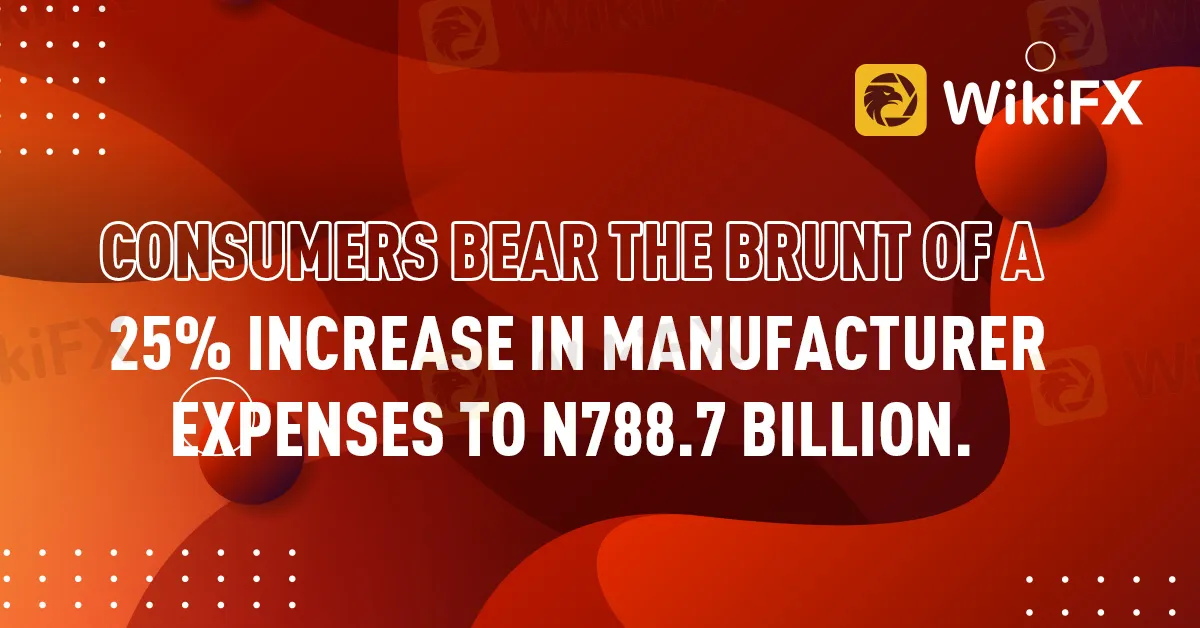简体中文
繁體中文
English
Pусский
日本語
ภาษาไทย
Tiếng Việt
Bahasa Indonesia
Español
हिन्दी
Filippiiniläinen
Français
Deutsch
Português
Türkçe
한국어
العربية
CONSUMERS BEAR THE BRUNT OF A 25% INCREASE IN MANUFACTURER EXPENSES TO N788.7 BILLION.
Abstract:Nigeria's consumer products manufacturing industry had a 25% increase in production costs in the first half of 2022, H1'22, despite the country's rising inflation. However, high cost is far more than the period's average inflation rate of 17%. This occurs despite the fact that the businesses are reporting slow growth and, in many instances, a flat reduction in output levels.

Nigeria's consumer products manufacturing industry had a 25% increase in production costs in the first half of 2022, H1'22, despite the country's rising inflation.
However, high cost is far more than the period's average inflation rate of 17%.
This occurs despite the fact that the businesses are reporting slow growth and, in many instances, a flat reduction in output levels.
Industry observers have identified a number of factors as the source of cost pressures, including concerns with energy costs related to fuel prices, rising foreign exchange costs for imported raw materials, high transportation costs, and higher labor costs, among others.
Nestle Nigeria Plc, Dangote Sugar, BUA Foods Plc, Nigerian Breweries, Guinness Nigeria Plc, Honeywell Flour Mills Plc, Cadbury Nigeria, PZ Cussons Industries, NASCO Allied Industries Plc, and GSK Consumer Nigeria Plc are among the businesses included in Financial Vanguard's findings basket.
Unilever Nigeria, Northern Nigeria Flour Mills, Union Dicon Salt Plc, Nigerian Enamelware Plc, International Breweries, Golden Guinea Breweries, Multi- Trex Integrated Foods Plc, among many others, are also among the cost leaders in the consumer products industry.
Top in rising costs
Among the companies with the highest costs is NASCO, which had an increase of nearly 57.6% to N16.8 billion in H1'22 from N10.6 billion in H1'21. Following closely after was GSK Consumer Nigeria Plc, whose operational costs increased by 56.1% to N11.0 billion from N7.1 billion in H1'21, and by 54.0% to N2.2 billion from N1.4 billion at Champion Breweries.
Nestle Nigeria Plc reported a cost increase of 43.4% to N75.3 billion from N52.5 billion in H1'21 and a cost increase of 41.9% to N146.6 billion from N103.5 billion in HI'21 for Dangote Sugar.
Companies with high production costs include BUA Foods Plc, which had the highest cost in H1 of 21 at N168.9 billion, Nigerian Breweries, which had a cost of N146.6 billion, and Dangote Sugar, which had a cost of N146.6 billion. Nestle reported N75.3 billion and Guinness Nigeria Plc N134.2 billion respectively.
The consumer products industry had revenue growth, which appears to be a consequence of the high cost of production that was passed on to consumers, despite the fact that inflation, rising unemployment, and other macroeconomic headwinds during the time period reduced consumers' purchasing power.
These companies' turnover and profit growth rates in H1'22 both exceeded the growth rates of the GDP and inflation, which were 3.54 percent and 18.6 percent, respectively, in the first half of the year.
In particular, the combined revenue of the 18 top firms in the manufacturing of consumer goods climbed by 29.6% to N1.16 trillion in H1'22 from N892.3 billion in H1'21.
Even more remarkably, their Profit Before Tax (PBT) increased from N 111.4 billion in H1'21 to N 173.85 billion in H1'22, a 56.1 percent increase.
Analysts highlighted that the Consumer Goods sector's performance was being held back by inflationary growth and added that, based on their turnover level, they must have passed along much more to consumers than their expenses, which had reduced effective demand.
However, given the remarkable achievement in their profit growth rate, they observed that the majority of the companies also did well in cost management.

Disclaimer:
The views in this article only represent the author's personal views, and do not constitute investment advice on this platform. This platform does not guarantee the accuracy, completeness and timeliness of the information in the article, and will not be liable for any loss caused by the use of or reliance on the information in the article.
Read more

FCA Identifies Clone Firm Exploiting Admiral Markets' Credibility
The UK Financial Conduct Authority (FCA) has issued a public warning regarding a fraudulent entity impersonating Admiral Markets, a legitimate and authorised trading firm. The clone firm, operating under the name Admiral EU Brokers and the domain Admiraleubrokerz.com, has been falsely presenting itself as an FCA-authorised business.

Malaysian Man Loses RM113,000 in Foreign Currency Investment Scam
A 57-year-old Malaysian man recently fell victim to a fraudulent foreign currency investment scheme, losing RM113,000 in the process. The case was reported to the Commercial Crime Investigation Division in Batu Pahat, which is now investigating the incident.

FCA Alerts Traders to New List of Unregulated and Clone Brokers
Protect your investments! Learn about unregulated firms flagged by the FCA and discover how WikiFX helps traders avoid scams and choose legitimate brokers.

The Funded Trader: Reactivates Accounts with Revised Payout Structure
Proprietary trading firm The Funded Trader has detailed its financial recovery efforts following a turbulent period marked by an unsustainable payout model. Addressing these challenges publicly, the firm outlined the steps being taken to resolve outstanding obligations and ensure operational sustainability.
WikiFX Broker
Latest News
Hackers Charged for $11M Crypto Theft Using SIM-Swaps
Role of Central Banks in the FX Market
FCA Alerts Against Sydney FX
What Makes Cross-Border Payments Easier Than Ever?
Trader Exposes Unethical Practices by STP Trading
Bitcoin Nears $100,000: A Triumph of Optimism or a Warning Sign?
Malaysian Man Loses RM113,000 in Foreign Currency Investment Scam
Mastercard Partners with JPMorgan for B2B Cross-Border Payments
FCA Identifies Clone Firm Exploiting Admiral Markets' Credibility
Coinbase Under Scrutiny Amid Wrapped Bitcoin Delisting Controversy
Currency Calculator


